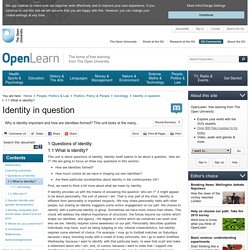

Linguistics essay. S0960-9822(09)01824-7?_returnURL= Figure 1 Box-Plot Diagram of the Values tnorm(F0max) and tnorm(Imax) Distribution of all observed melody and intensity contours in German and French newborns' crying, displayed as box plots of the 25th to 75th percentile, with the solid vertical line inside each box representing the median and the bars outside each box representing the minimum and maximum values.

The dashed vertical line represents a symmetric melody arc. The data indicate a preference for either rising (French group) or falling (German group) melodies. Figure 2 Time Waveform and Narrow-Band Spectrograms of a Typical French Cry and a Typical German Cry Figure 3 Diagrammed Cry Melody as Time Function of Fundamental Frequency F0 with Time-Normalized Duration Human fetuses are able to memorize auditory stimuli from the external world by the last trimester of pregnancy, with a particular sensitivity to melody contour in both music and language [1–3] . Unlocking past emotion: verb use affects mood and happiness. Language and Emotion – Insights from Psychological Science - Association for Psychological Science. News We use language every day to express our emotions, but can this language actually affect what and how we feel?

Two new studies from Psychological Science, a journal of the Association for Psychological Science, explore the ways in which the interaction between language and emotion influences our well-being. Putting Feelings into Words Can Help Us Cope with Scary Situations Katharina Kircanski and colleagues at the University of California, Los Angeles investigated whether verbalizing a current emotional experience, even when that experience is negative, might be an effective method for treating for people with spider phobias.
In an exposure therapy study, participants were split into different experimental groups and they were instructed to approach a spider over several consecutive days. Published online August 16, 2012 in Psychological Science Lead author: Katharina Kircanski — katharina.kircanski@gmail.com Unlocking Past Emotion: The Verbs We Use Can Affect Mood and Happiness. 13670050.2011. Change of Language, Change of Personality? Identity in question: 1.1 What is identity? - OpenLearn - Open University - DD100_2. This unit is about questions of identity.

Identity itself seems to be about a question, ‘who am I?’ We are going to focus on three key questions in this section: How are identities formed? How much control do we have in shaping our own identities? Are there particular uncertainties about identity in the contemporary UK? First, we need to think a bit more about what we mean by identity. If identity provides us with the means of answering the question ‘who am I?’ This example also illustrates the importance of marking oneself as having the same identity as one group of people and a different one from others. How do we know which people are the same as us? In this sense, although as individuals we have to take up identities actively, those identities are necessarily the product of the society in which we live and our relationship with others. However, how I see myself and how others see me do not always fit.
Self-construal and emotion in bicultural bilinguals. Sapir Whorf today. Sapir Whorf and emotion. Language and the Self. Language and the Mind Kenny. Evidentials, language & thought. Thinking in a Foreign Language Makes Decisions More Rational. To judge a risk more clearly, it may help to consider it in a foreign language.

A series of experiments on more than 300 people from the U.S. and Korea found that thinking in a second language reduced deep-seated, misleading biases that unduly influence how risks and benefits are perceived. “Would you make the same decisions in a foreign language as you would in your native tongue?” Asked psychologists led by Boaz Keysar of the University of Chicago in an April 18 Psychological Science study. “It may be intuitive that people would make the same choices regardless of the language they are using, or that the difficulty of using a foreign language would make decisions less systematic. We discovered, however, that the opposite is true: Using a foreign language reduces decision-making biases,” wrote Keysar’s team. 'Would you make the same decisions in a foreign language?
' The first experiment involved 121 American students who learned Japanese as a second language. Click to Open Overlay Gallery. The representation of motion in language and cognition.